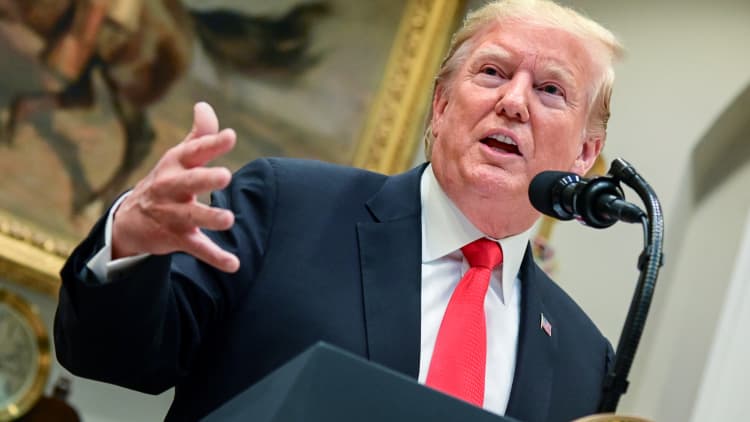DUBAI — Drone and missile debris recovered by investigators at the Saudi Aramco attack site is proof of Iranian culpability, a Saudi defense ministry representative said Wednesday, but he stopped short of saying Tehran launched the strike.
Twenty-five drones and missiles were used in Saturday's predawn attack that forced the Saudis to shut down half of the country's oil production, Saudi coalition spokesman Col. Turki al-Maliki said during a press briefing in Riyadh.
The briefing focused on projectile debris laid out on tables as well as aerial and close-up photos of Aramco's damaged facilities.
Al-Maliki said the drones used in the attacks — which had been claimed by Yemen's Houthi rebels — were Iranian delta-wing unmanned aerial vehicles, and that they came from the north to the south. He then rolled surveillance camera footage of what he said was a drone's approach to the Abqaiq oil facility.
NBC News has not verified the Saudi claims that the items displayed are remnants from Saturday's strike.
Speaking on behalf of the defense ministry, al-Maliki pointed to Shiite-dominated Iran — a longtime adversary of the Sunni monarchy — and "the destabilizing role Iran and its proxies play in the region."
Asked directly and repeatedly by a reporter whether the attacker was Iran, al-Maliki didn't answer, saying only, "I am controlling the conference," before moving onto another question.
Responding to another reporter on the topic of how Saudi Arabia would respond to the attacks, the spokesman said, "We are just a military tool. ... That is a decision for the political authorities."
"We have witnessed distinct growth in Iranian aggression," the spokesman said. "This attack wasn't against Saudi Aramco or Saudi Arabia, it was an attack against the international community, the whole world economy, and global trade."
Tehran has denied involvement in the attacks, calling the accusations from Saudi and U.S. officials "meaningless" and "pointless."
Al-Maliki said that all military components retrieved and analyzed from the Aramco facilities "point to Iran," and that "the attack could not have originated from Yemen ... (it was) not within the range of capability" of the Houthi rebel fighters.

A Houthi military spokesman responded roughly an hour later, rejecting the Saudi claims and saying that they had "new drones" capable of reaching targets "deep inside" Saudi territory as well as plans to attack the United Arab Emirates. The UAE is part of the Saudi-led coalition at war with the Houthis in Yemen, but has drawn down its presence there in recent months.
Pointing to the remains of a missile he said was found in Abqaiq, al-Maliki said, "We are working right now to share the data we have from the chips with the UN experts and we will share it with our allies."
Reiterating that the projectiles came from the north, he added that "right now we are working to know exactly the launch point."
The spokesman also refrained from answering a reporter's question about how the launch point would be determined, citing security reasons, but saying, "we have a lot of information, we have a lot of components from the attack itself."
Iran has been blamed for previous attacks on Saudi infrastructure typically claimed by Houthi rebels, who have been battling the Saudis in Yemen since 2015 and receive support from Tehran.
Weapons experts say that serial numbers on some of the missiles used by the Yemeni rebels in past attacks reveal their Iranian origin.
Saturday morning attacks
Attacks on Saudi Arabia's Abqaiq and Khurais oil facilities early Saturday forced the kingdom to shut down half its oil production capacity, or 5.7 million barrels per day of crude — 5% of the world's global daily oil production.
State oil giant Saudi Aramco has brought roughly half of that lost capacity back on line within two days, officials told media on Tuesday, and expect to return to full production by the end of September.
Abqaiq, located in the kingdom's oil-rich eastern province, is the world's largest oil processing facility and crude oil stabilization plant with a processing capacity of more than 7 million bpd. Khurais, which lies about 110 miles southwest of Abqaiq, has capacity to pump around 1.5 million bpd. Ten fires at the Abqaiq facility were put out within seven hours, Aramco's CEO said Tuesday.
Damage to the top OPEC producer's oil installations ignited fears of supply disruption around the world and sent crude prices soaring by double digits.
The news comes as the United Nations General Assembly gets underway and just hours after President Donald Trump announced he had instructed the Treasury Department to place more sanctions on Iran.
While Yemen's Houthi rebels, who have been at war with the Saudis since 2015, claimed responsibility for the attack, numerous officials and analysts point to Tehran. U.S. Secretary of State Mike Pompeo immediately blamed Iran, tweeting: "Iran has now launched an unprecedented attack on the world's energy supply. There is no evidence the attacks came from Yemen." Iran has continued to reject the charges.


